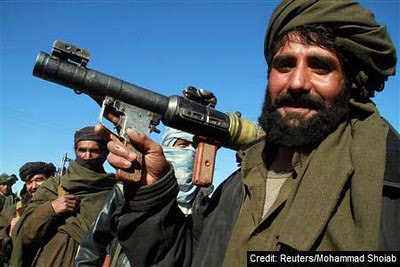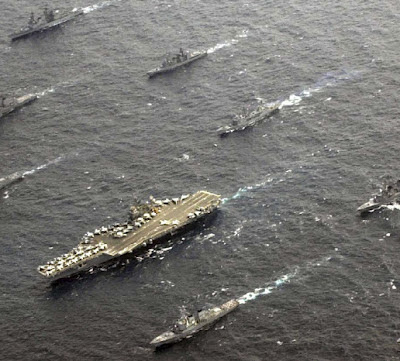 |
Libyan rebel military commander 'Abd al-Hakim Balhaj,
an associate of the late al-Qa'idah leader Usamah bin Ladin |
As their forefathers did over 1,300 years ago, the forces of militant Islam have swept across North Africa. Ridding the world of dictators and corrupt regimes is a good thing, but there are always unintended consequences.
In the case of those initial countries who have liberated themselves in what is known in the West as "the Arab spring" - Tunisia, Egypt and Libya - it appears that the replacement governments are going to be Islamic. They are going to be not only Islamic, but likely militant Islamist. Some of the leaders of the emerging governments seek a return to the caliphate of old.
The term caliphate derives from the Arabic khilāfah (خلافة, succession). The caliphate is primarily a Sunni Muslim construct and is the existential difference between the Sunnis and the Shi'a Muslims. The two sects evolved because of their differences over the issue of succession when Muhammad died in 632 – who would follow Muhammad as the leader of the faithful?
Many believed that the successor to Muhammad should be a family member, someone in the bloodline of the prophet. However, Muhammad had no son, so there was no male heir to assume the caliphate. Muhammad did have a daughter, Fatimah, who was married to Muhammad's cousin 'Ali bin Abu Talib. The people who favored the selection of 'Ali as the caliph were called the Shi'at 'Ali, the "partisans of 'Ali," hence the name Shi'a.
The other school of thought, held by many prominent Muslims of the day, was that the caliph should be drawn from one of the senior and learned members of the faith, the ummah or "community." These were the Sunnis, the traditionalists.
The Sunni position prevailed and the first three caliphs (Abu Bakr, 'Umar and 'Uthman) were not of Muhammad's bloodline. Finally, a convergence occurred in 656 when 'Ali (regarded by the Shi'a as the first imam) was named the fourth caliph. 'Ali was soon murdered and his son Hasan became the second Imam.
Real political power at this time rested with the Sunni caliph in Damascus. Hasan abdicated in favor of these 'Umayyad rulers. Following 'Ali, the succession took on the form of dynasties - the Umayyad, followed by the 'Abassid, the Fatimid and finally the Ottomans. The caliphate was abolished with the establishment of the Republic of Turkey in 1924.
In the aftermath of World War One and the defeat of the Ottoman Empire, the Middle East was carved up by Western powers. Regions in which Arab tribes lived were divided up. Lines were drawn on maps by people that did not live in the area. Countries that never before existed were created - Syria, Lebanon, Iraq and Jordan were established.
The Gaza Strip, West Bank and the area that is now Israel were administered by the United Kingdom under a United Nations mandate. In 1947, the United Nations voted to allow the partition of the Palestinian mandate into an Arab and Jewish state - this led to the creation of the State of Israel in 1948.
The creation of Israel was a watershed event in the Middle East. Many Arabs, especially the Palestinians, viewed this an attempt to assuage guilt for the actions of the Nazis, a misplaced attempt to create a homeland for the Jews at the expense of the local Arab population. I will not explore the merits of those beliefs - it is the perceptions that are important since they are the basis for Arab reaction.
Fast forward to the Yom Kippur war of 1973. When it was apparent that Israel was in danger of suffering a defeat at the hands of the Egyptian and Syrian armed forces, the United States military executed Operation Nickel Grass, the airlift/delivery of fighter aircraft, armor, artillery, munitions and other supplies to the the Jewish state. The operation turned the tide and the Israeli army soon moved to within 60 miles of Cairo on the Egyptian front, and to within less that 20 miles (well within artillery range) of Damascus on the Syrian front.
The American resupply of Israel led to a confrontation between the superpowers - the United States and the Soviet Union. Both countries put their armed forces on alert for possible intervention in the Middle East. On October 24, I remember going on alert for immediate deployment to counter Soviet moves in the region - it was the first time in 11 years, the first time since the Cuban missile crisis, that American forces went on worldwide alert.
At 11:41pm, the Joint Chiefs of Staff ordered all U.S. armed forces to assume DEFCON (Defense Condition) III which meant putting nuclear-armed units on the "highest state of peacetime alert." The next step, DEFCON II would ready the nuclear triad - strategic bombers, and land and submarine-based nuclear missiles - for imminent launch. The Pentagon alerted the 82nd Airborne Division and ordered the movement of aircraft carriers toward the Eastern Mediterranean. It was a scary time - trust me. Things were happening very quickly as young men from the armed forces of two nuclear-armed powers began to square off over events in a far-off corner of the world.
Cooler heads prevailed and both nations stepped back from the brink. Yet another United Nations resolution was adopted and life returned to the new normal. However, the incident indicated that events in the Middle East were not solely under the control of the people that live there, including the Arabs. When the Arabs and Jews/Israelis came to blows, it was the West and East blocs that actually called the shots (no pun intended).
Over the years following the Yom Kippur war, there were other smaller American/Western military interventions in the region, such as the Marine operation at Beirut airport, American deployments in support of Egypt and the Sudan, U.S. operations against Libya, and American support for Iraq against Iran, all in the in the 1980's. However, it was the 1990's that brought about the greatest confrontation between the West and the descendants of the Muslim caliphate.
In August 1990, Iraqi forces invaded the neighboring State of Kuwait, overpowering the capital city in less than five hours. In two days, there were substantial Iraqi forces on the northern border of Saudi Arabia. Any threat to the oilfields of Saudi Arabia were, and are, a red line for the United States. In what was another watershed event for the region and particularly its Muslim residents, the Saudi royal family asked the United States to deploy armed forces to defend the Kingdom from a potential Iraqi invasion. In the end, over half a million American troops deployed to defend Saudi Arabia and eject Iraqi forces from Kuwait.
It was the deployment of American troops to Saudi Arabia that germinated the seed of hatred among many Islamists. Saudi Arabia is home to the two holiest sites in Islam, the Ka'aba/Grand Mosque in Mecca and the Mosque of the Prophet in Medina. Note that the official title of the Saudi king is actually "Custodian of the Two Holy Mosques." This responsibility forms the social contract between the monarchy and the people of Saudi Arabia.
The introduction of American forces into what many Islamists consider holy ground caused a backlash among several groups, including the Muslim Brotherhood (al-ikhwan al-muslimin), and an organization of Arabs who had fought against the Soviets in Afghanstan, al-Qa'idah, led by a Saudi, Usamah bin Ladin. In 1996, bin Ladin issued a fatwa, an Islamic legal pronouncement, entitled "Declaration of War against the Americans Occupying the Land of the Two Holy Places."
We are all aware of al-Qa'idah's operations between 1996 and 2001. Following the American invasion of Afghanistan in October 2001, al-Qa'idah moved its operations to Pakistan, Iraq, Saudi Arabia, Yemen and Somalia. While their primary tactical goal was to kill Americans, the strategic goal always was the fall of current and corrupt Arab governments and the establishment of an Islamic state, or the forerunner to a caliphate.
In a bizarre and somewhat unexpected coincidence of events, the so-called "Arab Spring" brought new hope to the Islamists. It began in Tunisia and quickly spread to other venues, including Egypt, Yemen, Bahrain, Syria and Libya. North Africa is well on its way to becoming an Islamist bloc. Elections in Tunisia, Egyptand Morocco saw victories by Islamist parties. The new governments of Tunisia and Egypt will be dominated by these parties. Libya will likely follow after elections in April.
In the Kingdom of Morocco, an Islamic party gained a plurality in the hastily called elections and King Muhammad VI named its leader as prime minister. In Algeria, elections this spring will likely result in increased Islamist participation in the government - the campaigns are already underway. If you are an Islamist, you have to consider things to be looking good for your cause in North Africa.
Looking elsewhere in the region, Islamists are also likely pleased with events in Yemen. President 'Ali 'Abdullah Salih is about to renege on a deal that would grant him immunity in exchange for stepping down and leaving the country. This is a temporary reprieve for Salih; he is on his way out. After he eventually departs, there will be a power vacuum - look for al-Qa'idah in the Arabian Peninsula (AQAP) to consolidate its power and lead the country toward an Islamic state.
In Iraq, the fortunes of al-Qa'idah in Iraq (AQI) appeared to be on the decline until the scheduled - and some would say, premature - withdrawal of American forces from Iraq. No sooner were the Americans gone than a wave of sectarian violence re-ignited. While the Obama Administration bandies about claims of "success" in Iraq, the country is on the verge of another round of Sunni-Shi'a bloodshed.
As many Middle East analysts (including this one) predicted, AQI merely waited out the Americans to stick to an announced withdrawal timetable. This is what happens when you have a President with no military experience who refuses to listen to his military advisors. (See my earlier thoughts on that: Betrayals - Obama and the withdrawal from Iraq.)
In Turkey, the longstanding absolute separation of church and state is coming under attack. The Justice and Development Party (AKP) under Prime Minister Recep Tayyip Erdoğan is an Islamist party and is slowly attempting to replace secular democracy with Islamic law. Note that the terms "Justice and Development" are common to Islamist parties throughout the region.
There is some push back in the region as the Islamists seek to take power. In Syria, the opposition group calling itself the Syrian National Council is dominated by the Muslim Brotherhood. There is fear among some segments of the Syrian population that an Islamic government will seize power if the regime of Bashar al-Asad is overthrown. In an unlikely alliance against an Islamist takeover, the government has garnered support from secular Sunni groups, Christian residents and the Druze of the al-Suwayda' area. However, Islamists can still be hopeful that the government will fall, ushering in their successful takeover in Syria. It could go either way.
Looking to other locations as well, such as Somalia, Sudan, Nigeria and Mali, may give Islamists hope that their star (and crescent) is on the rise. Is there a chance we could see a new caliphate in the Middle East?
Let's hope not.













.jpg)
